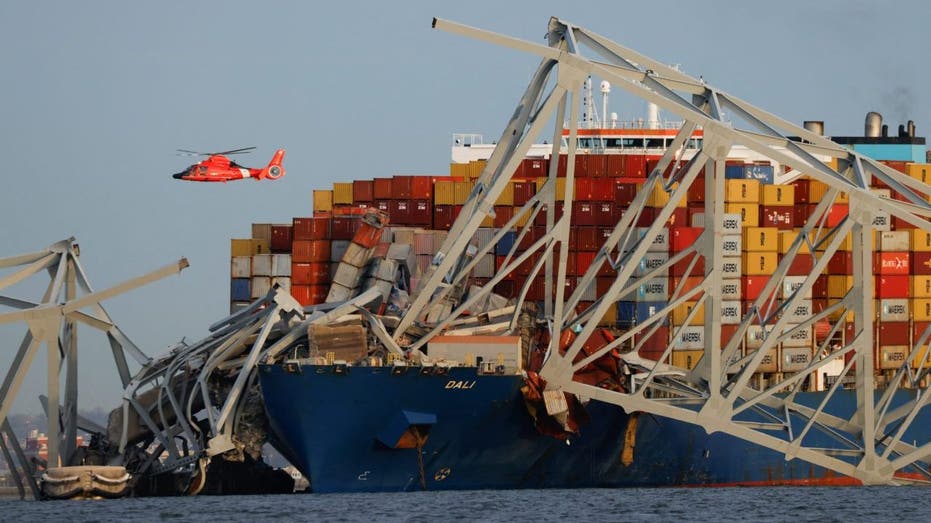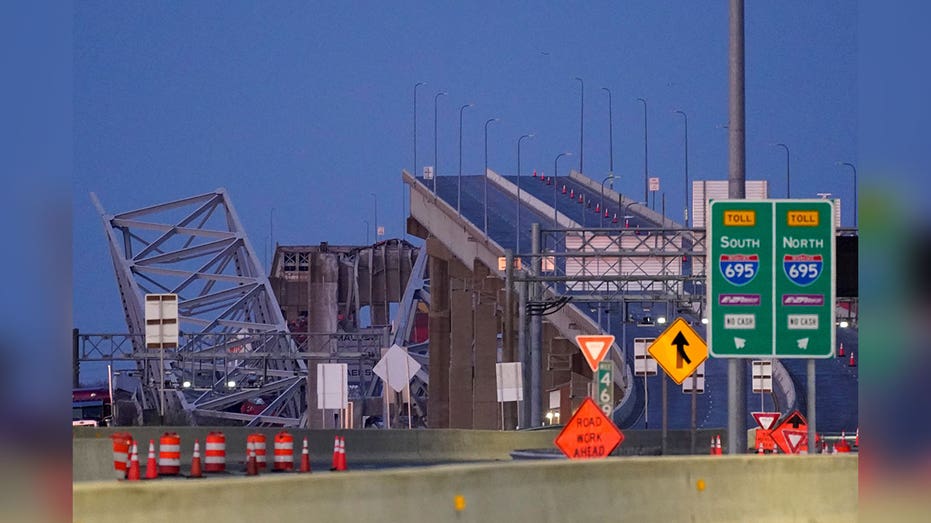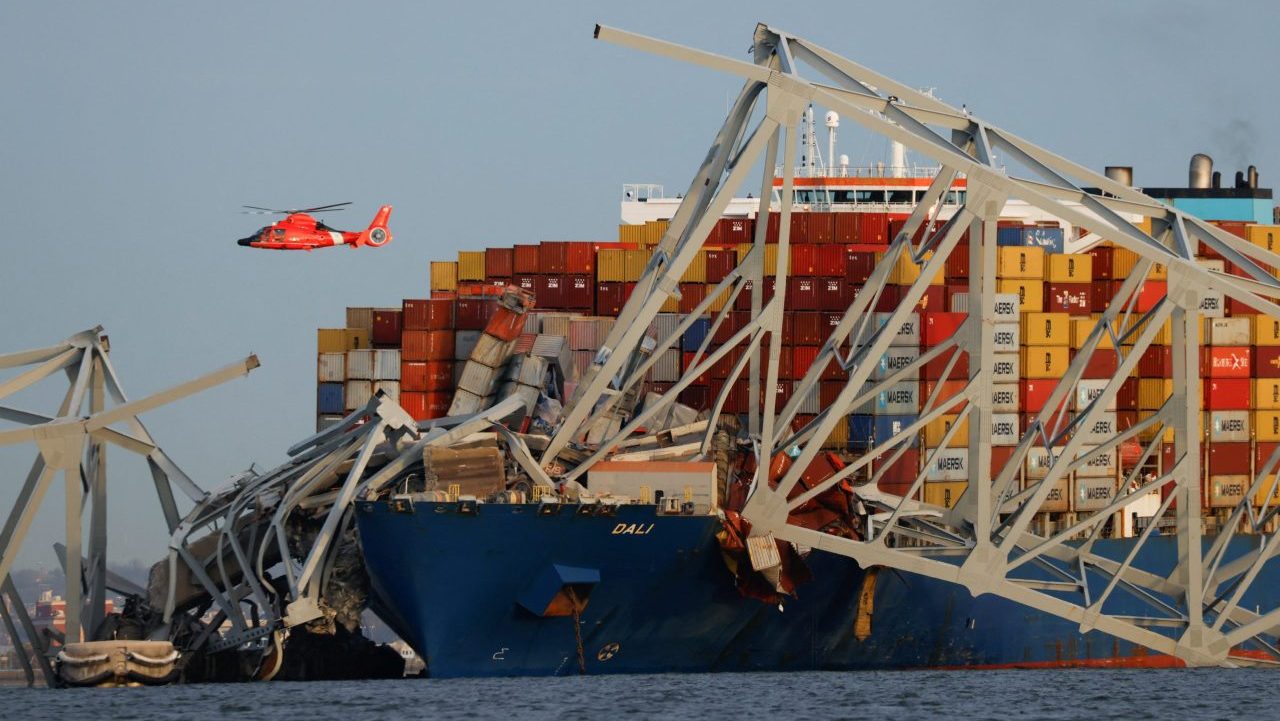Baltimore bridge collapse to bring trade and traffic chaos
The port handled a record amount of cargo last year, making it the 20th biggest port in the nation ranked by total tons
WATCH LIVE: Iconic Maryland bridge collapses into river after cargo ship collision
The Francis Scott Key Bridge crumbled into the Baltimore harbor early Tuesday morning.
The tragic collapse of the Francis Scott Key Bridge along I-695 in Maryland into the Baltimore harbor following a "ship strike" early Tuesday morning is expected to cause major economic disruptions to the area and across the country.
The port, a major route for shipping containers and cruise liners, is the deepest harbor in Maryland's Chesapeake Bay, closer to the Midwest than other East Coast ports, with five public and 12 private terminals, according to the Maryland government website.
The I-695 is also a critical link for trucking and motor vehicles linking Washington, Baltimore, Philadelphia and New York and the disaster comes ahead of the upcoming Easter Weekend.

A Coast Guard search and rescue helicopter flies over Dali cargo vessel which crashed into the Francis Scott Key Bridge causing it to collapse in Baltimore, Maryland. (Julia Nikhinson / Reuters Photos)
2 PEOPLE RESCUED, SEVERAL MISSING AFTER SHIP STRIKE TRIGGERS BALTIMORE BRIDGE COLLAPSE
The port is the busiest in the U.S. for car shipments, handling more than 750,000 vehicles in 2023, according to data from the Maryland Port Administration. It is also the largest U.S. port by volume for handling farm and construction machinery, as well as agricultural products.
It handled a record amount of cargo last year, making it the 20th biggest port in the nation ranked by total tons, according to the Bureau of Transportation Statistics.
Chloe Demrovsky, the executive in residence in global economy at New York University, tells Fox News Digital that the port has grown significantly over the last few years and the bridge collapse is going to have a devastating impact on the area.
"Since the widening of deepening of the Panama Canal in 2016, it just became that much more important and capable of docking some of those really large container ships coming out of Asia that could now come through the Panama Canal and go to Baltimore," Demrovsky said.
"And from there they can connect with the important trucking routes to service not just the whole country, but in particular the very busy eastern corridor. So it became a really strategically important area for moving a lot of units."
The port is one of the smallest on the Northeastern seaboard, handling 265,000 containers in the fourth quarter of last year, Reuters reports. In comparison, the Port of New York and New Jersey handled around 2 million containers in that same period, and Norfolk Port in Virginia handled 850,000.
The cargo ship that hit the bridge was the Dali, a 95,000 GT Singapore-flagged container ship on its way to Sri Lanka, the Maritime and Port Authority (MPA) of Singapore confirmed. It is stacked with dozens of cargo containers carrying Maersk customers’ cargo. There were 22 crew members onboard at the time of the incident, although Maersk said none of its crew and personnel were on the vessel.

Parts of the Francis Scott Key Bridge remain after a container ship collided with the support beam on Tuesday. (Nathan Howard / Reuters Photos)
It was not immediately clear what type of cargo is on the Dali.
The port is also popular with cruise liners, with operators including Norwegian, Carnival and Royal Caribbean all using the port for Caribbean, Canadian and other Atlantic destinations, Reuters reports. In 2023, cruises carrying more than 444,000 passengers departed from the port, the Maryland government website says.
AUTHORITIES RACE TO SAVE LIVES AFTER BRIDGE COLLAPSE AMID FRIGID WATER TEMPS
According to the ship tracking service Marine Traffic, there are currently eight bulk carriers and one vehicle carrier headed for Baltimore that are now waiting at anchor just off Ken Island, which is about 20 miles south of the Francis Scott Key Bridge.
"It's hard to know exactly how this is going to work out because you have the port issue and then you have the trucking issue. And with I695 down, that's where a lot of these oversized trucks and hazardous materials were being routed along that whole corridor."
"So as we go into the holiday weekend, we're just going to see a snarl. And it's going to take quite a while for it to shift until something can be done in that area."
More than 40 ships remained inside Baltimore port, including small cargo ships, tug boats and pleasure craft, data from ship tracking and maritime analytics provider MarineTraffic shows.
Demrovsky says that some of the vessels could be rerouted to the West Coast, meaning cargo would have to be trucked back across the country which is much more expensive and time-consuming. Furthermore, several prominent companies have distribution warehouses or other facilities in an industrial park on the north end of the bridge including Amazon.com and FedEx.

Officials said "upwards of seven" people were missing and that two had been pulled from the water. No casualties have been reported yet. (Rob Carr / Getty Images)
Demrovsky said we could also see price hikes to cover these costs, while insurance for vessels could also balloon.
"We are already seeing major insurance issues around some of the Red Sea issues and some of the other issues we're seeing around shipping, there's just been a lot of attention on the supply chain since Covid … and so it's harder to get insurance for these major, shipping ships anyway."
Meanwhile, Rep. Carol Miller, R-W.Va., who sits on the trade subcommittee, also said the incident will impact commerce.
"Of course it will affect trade. I’m worried about the families and all of the inconvenience that will occur because the bridge is gone. It was such a good link," Miller told Fox News Tuesday.
CLICK HERE TO READ MORE ON FOX BUSINESS
A spokesperson for the Royal Caribbean tells Fox News Digital that the company is "deeply saddened by the tragedy" and extends its "heartfelt prayers to all those impacted."
The company's Vision of the Seas’ liner uses the Baltimore port and alternatives are now being made for its ongoing and upcoming sailings, the spokesperson said. The vessel is expected to arrive in the Virgin Islands on Wednesday morning, according to SeaScanner.com
Reuters contributed to this report.





















